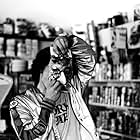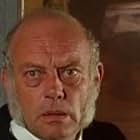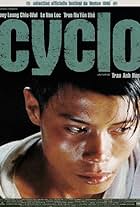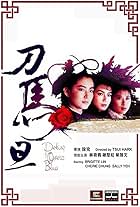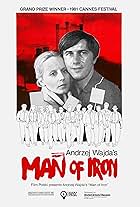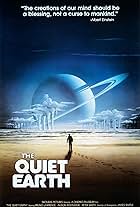IMDb RATING
6.9/10
1.5K
YOUR RATING
In 1870, a Maori warrior working with the British finds his village massacred, and vows revenge.In 1870, a Maori warrior working with the British finds his village massacred, and vows revenge.In 1870, a Maori warrior working with the British finds his village massacred, and vows revenge.
- Awards
- 1 nomination total
- Director
- Writers
- All cast & crew
- Production, box office & more at IMDbPro
Featured reviews
This film takes place during the New Zealand Land Wars and does justice to the portrayal of violence and revenge (hence the title). The setting is lively and convincing and the story shows the conflict between all people without oversimplifying.
This movie might remind you of "Dances With Wolves." I enjoyed it, and thought it gave a good insight into Maori history and culture.
Leonard Maltin gave it a less-than-appealing review while another book loved it. I rank it more in the middle and more towards the "other book" with the second half redeeming it.
If you are into something different, try out this New Zealand western. I am a HUGE fan of kiwi actor Bruno Lawrence (Williamson in this film). I recommend it.
*** out of ****
Leonard Maltin gave it a less-than-appealing review while another book loved it. I rank it more in the middle and more towards the "other book" with the second half redeeming it.
If you are into something different, try out this New Zealand western. I am a HUGE fan of kiwi actor Bruno Lawrence (Williamson in this film). I recommend it.
*** out of ****
Well-made actioner could have benefited from a script that took more time to establish characters and historical context. The film opens with a horrific massacre of a Maori village, which drives native soldier Te Wheke (Anzac Wallace) to swear a blood vendetta ('utu') against the white man. Unfortunately, there is no explanation given for the massacre, and we know nothing about Te Wheke except that until then he was a soldier in the white man's army.
Despite this narrative gap, the action which follows is reasonably compelling in the manner of a Don Siegel or John Sturges Western. Besides the strong performance by Wallace, Kelly Johnson is good as the baby-faced army lieutenant charged with introducing new-fangled 'commando' tactics from the Boer War, and Bruno Lawrence has a field day as a gun-obsessed homesteader who swears his own oath of vengeance against Te Wheke after his wife is killed. (Wait till you see the shotgun he puts together in his shed!) Geoff Murphy's direction is straightforward, if sometimes muddled during shootouts, and other pluses are the authentic period production design and weaponry, along with mobile camera-work by Graeme Cowley on rugged New Zealand landscapes.
Not a profound work, but entertaining for its historical milieu, based on real incidents. Be warned that the DVD transfer is not the best.
Despite this narrative gap, the action which follows is reasonably compelling in the manner of a Don Siegel or John Sturges Western. Besides the strong performance by Wallace, Kelly Johnson is good as the baby-faced army lieutenant charged with introducing new-fangled 'commando' tactics from the Boer War, and Bruno Lawrence has a field day as a gun-obsessed homesteader who swears his own oath of vengeance against Te Wheke after his wife is killed. (Wait till you see the shotgun he puts together in his shed!) Geoff Murphy's direction is straightforward, if sometimes muddled during shootouts, and other pluses are the authentic period production design and weaponry, along with mobile camera-work by Graeme Cowley on rugged New Zealand landscapes.
Not a profound work, but entertaining for its historical milieu, based on real incidents. Be warned that the DVD transfer is not the best.
Utu is quite a good film. Having said that, it is quite possible that we have seen it before in other settings.
Utu is unique in that it is one of the few films available in North America dealing with the Maori culture of New Zealand. Other than that, the film is basically an anti colonial sentimented film which could have taken place almost anywhere else in the world where colonialism was experienced.
Utu still manages to pack a punch in the very earnest way the main character sets out to rid his country of the white invaders. Utu, meaning revenge, is the basic theme of this story. The colonial army in the film pillages Maori villages. The Maori corporal who quits the army to fight against it seeks revenge. The story is simple, yet compelling.
The film examines imperialism in a light not uncommon to stories of this nature, but it is better in the sense that it does not try to gloss over the anger of the natives by arming them conveniently with western values. That is a crime many movies are guilty of. The level of violence in the film is typical by genre standards, and it actually lends itself to the films raw emotion. This one's worth a look.
Utu is unique in that it is one of the few films available in North America dealing with the Maori culture of New Zealand. Other than that, the film is basically an anti colonial sentimented film which could have taken place almost anywhere else in the world where colonialism was experienced.
Utu still manages to pack a punch in the very earnest way the main character sets out to rid his country of the white invaders. Utu, meaning revenge, is the basic theme of this story. The colonial army in the film pillages Maori villages. The Maori corporal who quits the army to fight against it seeks revenge. The story is simple, yet compelling.
The film examines imperialism in a light not uncommon to stories of this nature, but it is better in the sense that it does not try to gloss over the anger of the natives by arming them conveniently with western values. That is a crime many movies are guilty of. The level of violence in the film is typical by genre standards, and it actually lends itself to the films raw emotion. This one's worth a look.
While it is slightly confusing on a first viewing for someone with scant background knowledge about the setting, Utu is still a largely entertaining, interesting and well made film with an odd tonal combination of a western, a war film, a Charles Bronsonish revenge flick and touches of macabre comedy.
Utu is inspired by true events in New Zealand circa 1870. We focus on a military-oriented motley crew of English, Caucasian New Zealanders, or Pakeha, and natives of Polynesian descent, or Maori. The general atmosphere in the film is similar to the pioneer atmosphere of some U.S.-oriented westerns set in the late 19th Century. The plot is catalyzed by fighting among the English, Pakeha and Maori with difficult-to-discern lines of division. To an extent, it seems that these oppositional groupings must have been somewhat chaotic in reality, and especially Maori are shown flitting from side to side.
The important points for the film, though, are that we're shown the massacre of a Maori village by Caucasians in the beginning, and we're shown the Maori Te Wheke (Anzac Wallace) happening upon the aftermath of the massacre, whereupon he swears revenge, or "utu", on the white men for their misdeeds. His chief opponent is Lieutenant Scott (Kelly Johnson) a very young Pakeha (who looks a lot like a young Jay Mohr) with a very multicultural band of military men under his command. A homesteader named Williamson (Bruno Lawrence) also becomes unwillingly involved, and Scott is under the command of a relatively staunch Colonel Elliot (Tim Elliott). On the "forest" level, the film is a relatively simple coming together of these characters as Te Wheke seeks his revenge.
In terms of action and the film's western modes, Utu is very satisfying. The attack scenes are thrilling, visceral and even occasionally gory. The western scenes are often accompanied by beautiful cinematography, sometimes with wide landscape shots showing the varied and gorgeous natural features of New Zealand. For voracious viewers of American films, the western material periodically feels more like a low-key Civil War movie. Writer/director Geoff Murphy meshes all of these styles together well.
The film's politics and ethics are kept complexly gray. Maybe a bit too gray, considering how difficult it can be to keep all of the characters and their sides straight, but on the other hand, Murphy is probably shooting for historical accuracy in the complexity, so it's at least understandable on that end.
Wallace makes a great anti-hero. At first, when he happens upon the aftermath of the Maori village massacre, we deeply sympathize with him, but shortly after this scene, he's hacking and shooting up everyone more like a serial killer, or a Maori Charles Manson. Still, sympathy with the character doesn't completely disappear, and it may be helped if one is familiar with New Zealand history--I would suspect that in general, the Maori received treatment from Caucasians something like American Indians did. The scene with Te Wheke undergoing a ritual scarification/tattooing is one of the best symbolic "obedient do-gooder to avenging hurricane" transformations I've seen, even though it is fairly understated. Wallace's role as a rip roarin' antihero is even more interesting in light of his offscreen history. Born Norman Pene Rewiri, he committed armed robbery as a youth, was sent to prison for a number of years, changed his name to Wallace, and became a union organizer. Utu was his first film.
Murphy also peppers Utu with a very interesting romance between Lt. Scott and a Maori woman, Kura (Tania Bristowe), who weaves her loyalties in and out of Te Wheke's gang. This is one of two tragic romances in the film--the other being between Williamson and his wife, Emily (Ilona Rodgers)--that fuel "big turning points" at other times in the plot in a deepening of the film's theme of karmic retribution, or as an earlier scene notes, "He who lives by the sword shall die by the sword". Thematically/subtextually, Murphy passes with flying colors.
The performances are good, and Murphy's direction in terms of blocking, tonalities, pacing, editing and so on is great. My score for Utu is really a "high 7". I wish I could have given the film an even higher score, and I can envision myself appreciating it more on subsequent viewings (provided I don't completely forget about all of the factual background material I've looked up since watching it), but my confusion with the plot and characters just wouldn't allow that, no matter how much I enjoyed the film otherwise. I know that some of the problems I had were with dialogue and pronunciations--this is definitely a film that could have benefited from subtitles.
But Utu has some great scenes, some excellent extended sequences (including the homesteader sequence and the climax--both were incredibly suspenseful), some memorable characters, and a wicked sense of humor--there were a couple times I almost felt as if the film were turning into a "black comedy". It's worth checking out if you're into world cinema or any of the film's genres, and probably even more imperative to watch if you have an interest in New Zealand history.
Utu is inspired by true events in New Zealand circa 1870. We focus on a military-oriented motley crew of English, Caucasian New Zealanders, or Pakeha, and natives of Polynesian descent, or Maori. The general atmosphere in the film is similar to the pioneer atmosphere of some U.S.-oriented westerns set in the late 19th Century. The plot is catalyzed by fighting among the English, Pakeha and Maori with difficult-to-discern lines of division. To an extent, it seems that these oppositional groupings must have been somewhat chaotic in reality, and especially Maori are shown flitting from side to side.
The important points for the film, though, are that we're shown the massacre of a Maori village by Caucasians in the beginning, and we're shown the Maori Te Wheke (Anzac Wallace) happening upon the aftermath of the massacre, whereupon he swears revenge, or "utu", on the white men for their misdeeds. His chief opponent is Lieutenant Scott (Kelly Johnson) a very young Pakeha (who looks a lot like a young Jay Mohr) with a very multicultural band of military men under his command. A homesteader named Williamson (Bruno Lawrence) also becomes unwillingly involved, and Scott is under the command of a relatively staunch Colonel Elliot (Tim Elliott). On the "forest" level, the film is a relatively simple coming together of these characters as Te Wheke seeks his revenge.
In terms of action and the film's western modes, Utu is very satisfying. The attack scenes are thrilling, visceral and even occasionally gory. The western scenes are often accompanied by beautiful cinematography, sometimes with wide landscape shots showing the varied and gorgeous natural features of New Zealand. For voracious viewers of American films, the western material periodically feels more like a low-key Civil War movie. Writer/director Geoff Murphy meshes all of these styles together well.
The film's politics and ethics are kept complexly gray. Maybe a bit too gray, considering how difficult it can be to keep all of the characters and their sides straight, but on the other hand, Murphy is probably shooting for historical accuracy in the complexity, so it's at least understandable on that end.
Wallace makes a great anti-hero. At first, when he happens upon the aftermath of the Maori village massacre, we deeply sympathize with him, but shortly after this scene, he's hacking and shooting up everyone more like a serial killer, or a Maori Charles Manson. Still, sympathy with the character doesn't completely disappear, and it may be helped if one is familiar with New Zealand history--I would suspect that in general, the Maori received treatment from Caucasians something like American Indians did. The scene with Te Wheke undergoing a ritual scarification/tattooing is one of the best symbolic "obedient do-gooder to avenging hurricane" transformations I've seen, even though it is fairly understated. Wallace's role as a rip roarin' antihero is even more interesting in light of his offscreen history. Born Norman Pene Rewiri, he committed armed robbery as a youth, was sent to prison for a number of years, changed his name to Wallace, and became a union organizer. Utu was his first film.
Murphy also peppers Utu with a very interesting romance between Lt. Scott and a Maori woman, Kura (Tania Bristowe), who weaves her loyalties in and out of Te Wheke's gang. This is one of two tragic romances in the film--the other being between Williamson and his wife, Emily (Ilona Rodgers)--that fuel "big turning points" at other times in the plot in a deepening of the film's theme of karmic retribution, or as an earlier scene notes, "He who lives by the sword shall die by the sword". Thematically/subtextually, Murphy passes with flying colors.
The performances are good, and Murphy's direction in terms of blocking, tonalities, pacing, editing and so on is great. My score for Utu is really a "high 7". I wish I could have given the film an even higher score, and I can envision myself appreciating it more on subsequent viewings (provided I don't completely forget about all of the factual background material I've looked up since watching it), but my confusion with the plot and characters just wouldn't allow that, no matter how much I enjoyed the film otherwise. I know that some of the problems I had were with dialogue and pronunciations--this is definitely a film that could have benefited from subtitles.
But Utu has some great scenes, some excellent extended sequences (including the homesteader sequence and the climax--both were incredibly suspenseful), some memorable characters, and a wicked sense of humor--there were a couple times I almost felt as if the film were turning into a "black comedy". It's worth checking out if you're into world cinema or any of the film's genres, and probably even more imperative to watch if you have an interest in New Zealand history.
Did you know
- TriviaUtu is translated (by the Maori people) not as revenge, but as balanced exchange or reciprocity.
- Alternate versionsOriginal New Zealand version runs 118 minutes; US version was cut to 105 minutes.
- ConnectionsFeatured in Making Utu (1983)
- How long is Utu?Powered by Alexa
Details
Box office
- Gross worldwide
- $1,650
- Runtime1 hour 44 minutes
- Sound mix
- Aspect ratio
- 1.85 : 1
Contribute to this page
Suggest an edit or add missing content










